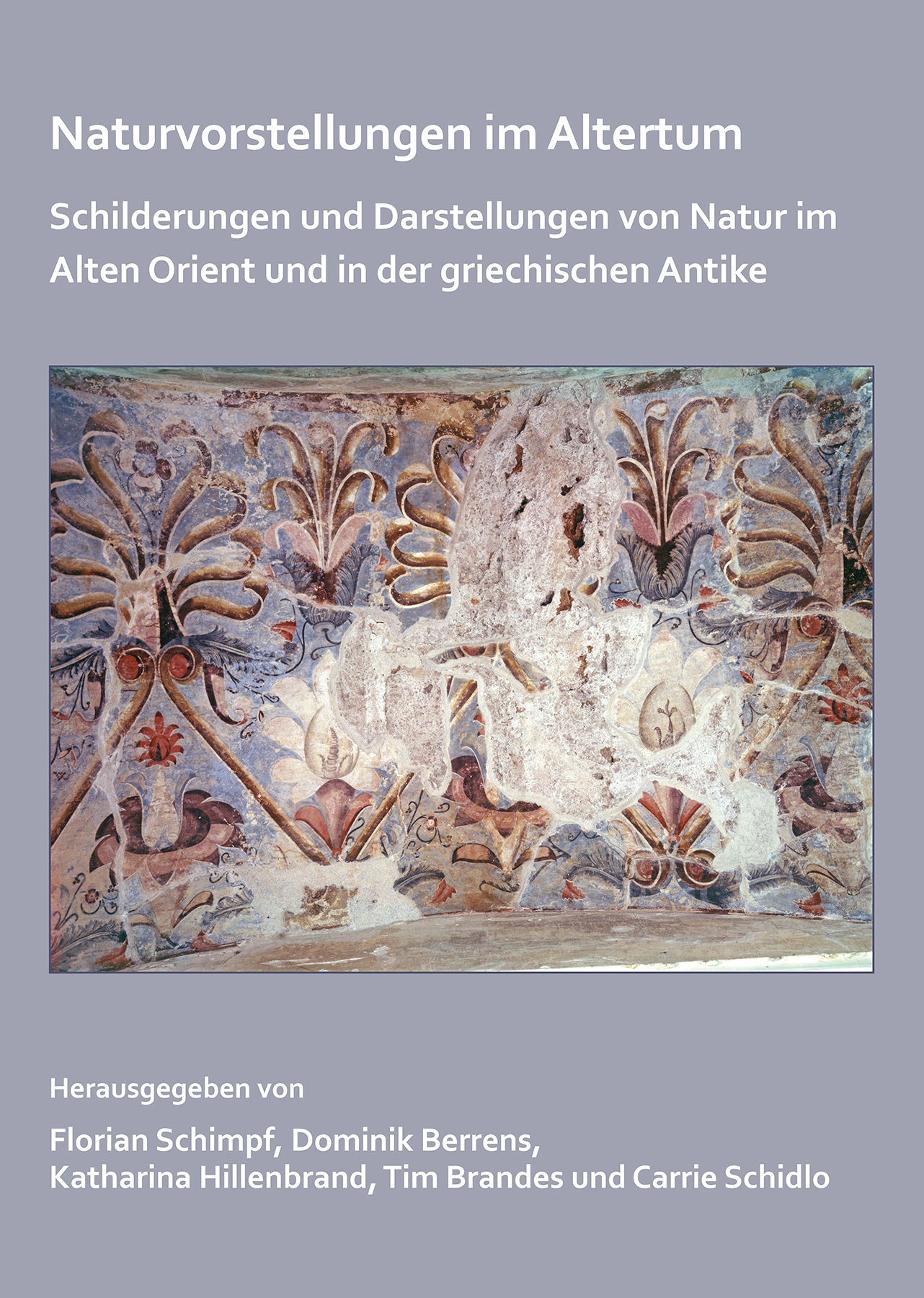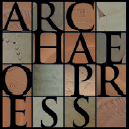
Publishing Scholarly Archaeology since 1997

Download Sample PDF
H 290 x W 205 mm
262 pages
Illustrated throughout in colour and black & white (56 colour plates)
German text
Published Jun 2018
ISBN
Paperback: 9781784918255
Digital: 9781784918262
Keywords
Nature; Classical Archaeology; Classical Philology; Ancient Near Eastern Studies; conceptions; vase painting; drama; Hellenistic poetry; natural sanctuaries
Naturvorstellungen im Altertum
Schilderungen und Darstellungen von Natur im Alten Orient und in der griechischen Antike
Edited by Florian Schimpf, Dominik Berrens, Katharina Hillenbrand, Tim Brandes, Carrie Schidlo
This volume looks at the concepts of nature in texts as well as in archaeological remains of the Ancient Near Eastern and Greek cultures from the Archaic to the Hellenistic period. Contributions from the fields of archaeology and philology are juxtaposed for each time period in chronological order.
Contents
Geleitwort
Vorwort
‚Natur‘ nach modernem und antikem Verständnis – Tim Brandes und Katharina Hillenbrand
Naturkonzepte im Alten Orient – Claus Ambos
Natur- und Vegetationsdarstellungen im Alten Orient – Alexander Pruß
Über Naturphänomene in der archaisch-griechischen Flächenkunst – Ursula Mandel
Naturdarstellungen in der griechischen Vasenmalerei klassischer Zeit Ein Beitrag zu Natur und Raum* – Marta Scarrone
Naturdarstellungen im attischen Drama – Dominik Berrens
Separierte Naturmale und die additive Sakralisierung natürlicher Elemente – Florian Schimpf
Zwischen ‚Wissenschaft‘ und Fiktion –Menschen, Götter und Heroen in Naturlandschaften der hellenistischen Dichtung – Annemarie Ambühl
Öffentliches Grün in griechischen Städten – Sabine Neumann
*Dieser Artikel ist nur in der Printausgabe verfügbar.
*This article is only available in the print edition.
About the Author
Florian Schimpf studied Classical Archaeology and History at the universities of Frankfurt and Istanbul, whilst gaining practical experiences by participating in excavations in Priene (Turkey), Portugal and on the Balkans. In 2013 he joined the Research Training Group “Early Concepts of Man and Nature” at the University of Mainz with a project on natural sanctuaries in ancient Greece and Asia Minor. His research interests lie in the fields of religious history, Greek cult practices and metrology.
Dominik Berrens studied Classical Philology and Biology at the University of Freiburg. From 2013-2017 he was part of the Research Training Group “Early Concepts of Man and Nature” at the University of Mainz, where he received his doctorate with a dissertation on social insects in antiquity in 2016. Since October 2017 he has been a postdoctoral researcher working on the project “NOSCEMUS – Nova Scientia: Early Modern Science and Latin” funded by the European Research Council at the University of Innsbruck. His research interests lie in pre-modern scientific texts and ancient drama.
Katharina Hillenbrand studied Classical Philology and German Studies at the Universities of Würzburg and Frankfurt. In 2014 she joined the Research Training Group “Early Concepts of Man and Nature” at the University of Mainz with a project on concepts of volcanic phenomena in Roman antiquity. Currently she is working at the department of Classical Philology at the University of Frankfurt. Her research interests lie in the fields of ancient meteorology, the literary formation of natural phenomena and Neronian literature.
Tim Brandes studied Ancient Near Eastern Studies and Egyptology at the University of Göttingen. Since 2014 he is a member of the Research Training Group “Early Concepts of Man and Nature” at the University of Mainz, where he is working on a project on Babylonian and Assyrian concepts of time. His research interests lie in the fields of Assyrian and Babylonian astronomy, scholarship and religion.
Carrie Schidlo studied Classical Archaeology, Egyptology and Near Eastern Studies at the University of Göttingen after working as a pharmaceutical technical assistant. From 2014 till 2016 she was part of the Research Training Group “Early Concepts of Man and Nature” at the University of Mainz. Since 2017 she has been working at the General Medical Council of Rhineland-Palatinate. Her areas of research are the Hellenistic and Roman periods of Egypt, especially their funerary customs, as well as ancient medicine and archaeobotany.
auf Deutsch
Florian Schimpf studied Classical Archaeology and History at the universities of Frankfurt and Istanbul, whilst gaining practical experience by participating in excavations in Priene (Turkey), Portugal and the Balkans. In 2013 he joined the Research Training Group “Early Concepts of Man and Nature” at the University of Mainz with a project on natural sanctuaries in ancient Greece and Asia Minor. His research interests lie in the fields of religious history, Greek cult practices and metrology.
Dominik Berrens studied Classical Philology and Biology at the University of Freiburg. From 2013-2017 he was part of the Research Training Group “Early Concepts of Man and Nature” at the University of Mainz, where he received his doctorate with a dissertation on social insects in antiquity in 2016. Since October 2017 he has been a postdoctoral researcher working on the project “NOSCEMUS – Nova Scientia: Early Modern Science and Latin” funded by the European Research Council at the University of Innsbruck. His research interests lie in pre-modern scientific texts and ancient drama.
Katharina Hillenbrand studied Classical Philology and German Studies at the Universities of Würzburg and Frankfurt. In 2014 she joined the Research Training Group “Early Concepts of Man and Nature” at the University of Mainz with a project on concepts of volcanic phenomena in Roman antiquity. Currently she is working at the department of Classical Philology at the University of Frankfurt. Her research interests lie in the fields of ancient meteorology, the literary formation of natural phenomena and Neronian literature.
Tim Brandes studied Ancient Near Eastern Studies and Egyptology at the University of Göttingen. Since 2014 he has been a member of the Research Training Group “Early Concepts of Man and Nature” at the University of Mainz, where he is working on a project on Babylonian and Assyrian concepts of time. His research interests lie in the fields of Assyrian and Babylonian astronomy, scholarship and religion.
Carrie Schidlo studied Classical Archaeology, Egyptology and Near Eastern Studies at the University of Göttingen after working as a pharmaceutical technical assistant. From 2014 to 2016 she was part of the Research Training Group “Early Concepts of Man and Nature” at the University of Mainz. Since 2017 she has been working at the General Medical Council of Rhineland-Palatinate. Her areas of research are the Hellenistic and Roman periods of Egypt, especially their funerary customs, as well as ancient medicine and archaeobotany.

 Add to wishlist
Add to wishlist
